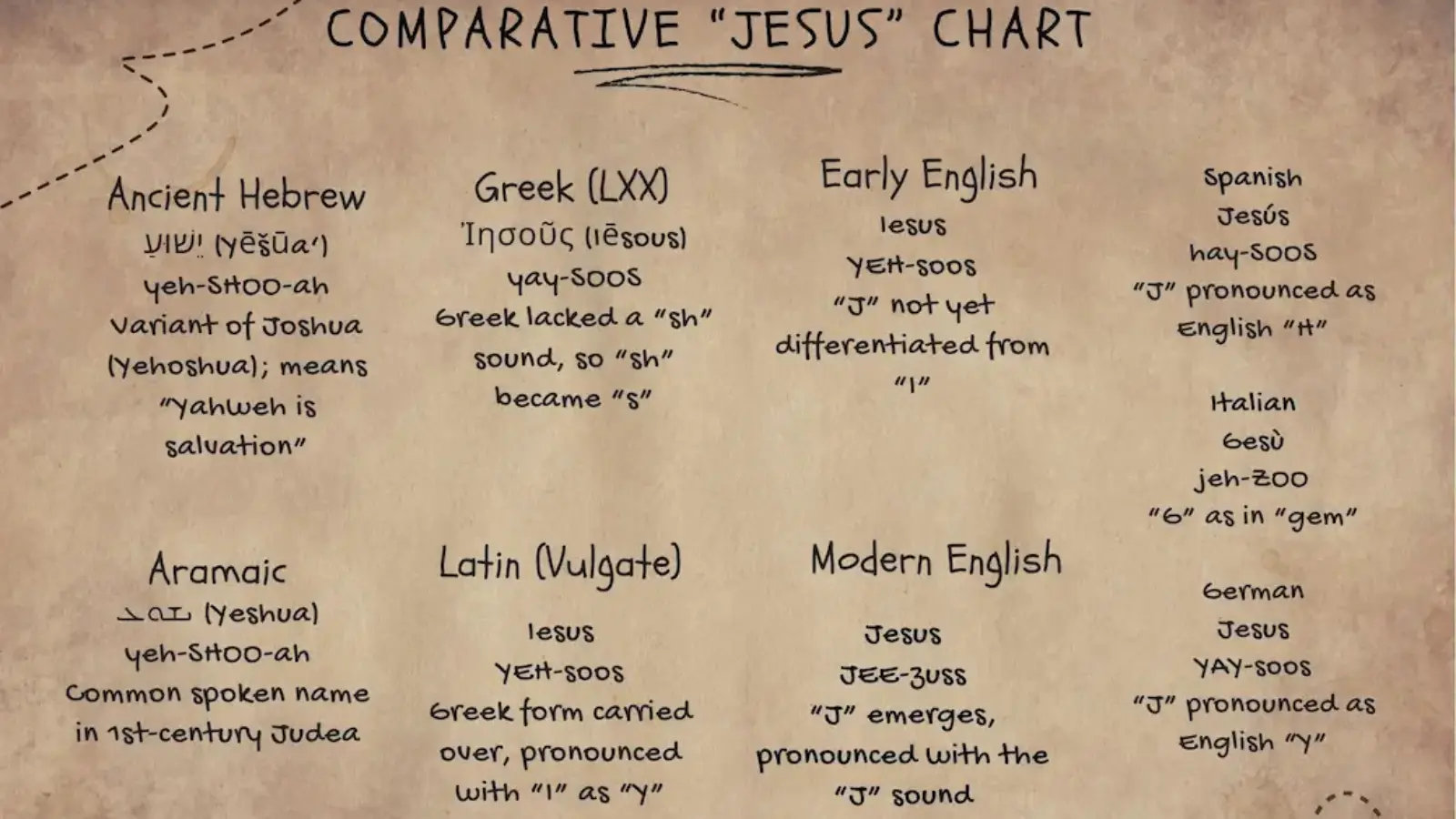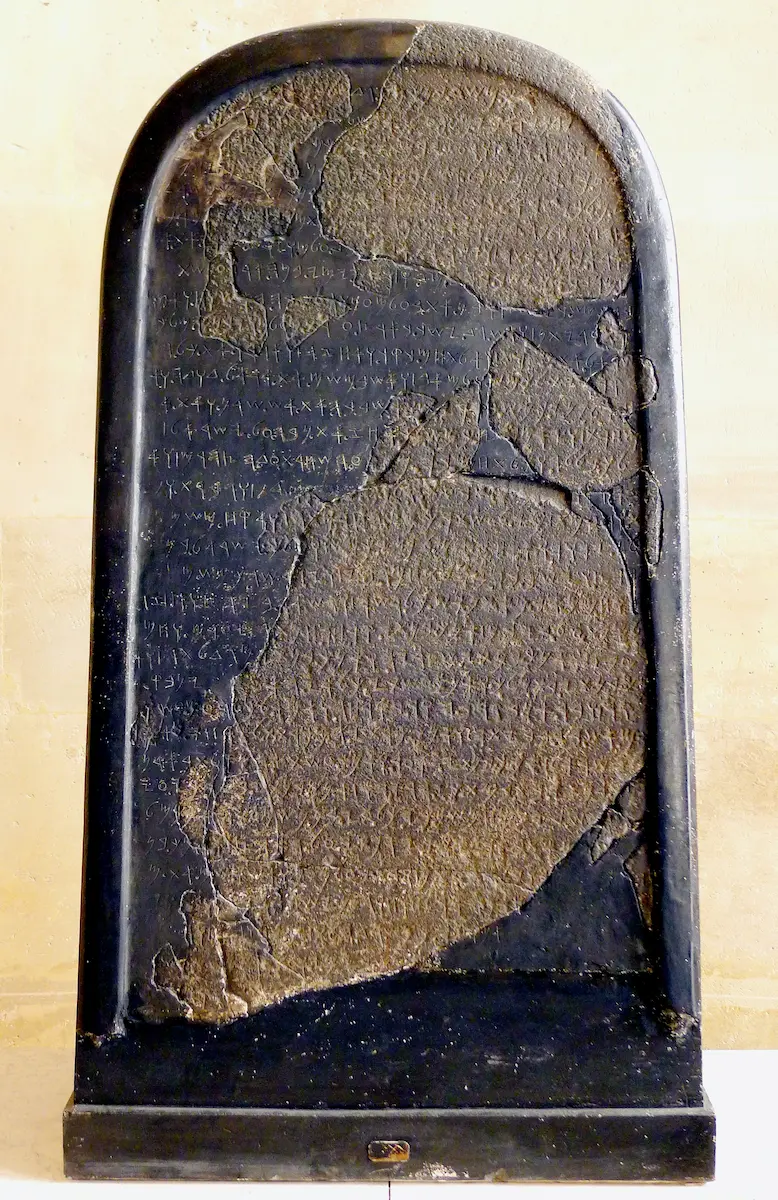Tracing the Name of Jesus: Etymology, Linguistic Evolution, and the Obsession with Sacred Pronunciation
How did “Jesus” evolve from ancient Hebrew to modern English? This deep-dive traces the journey across languages—and unpacks the surprising ways Christians have turned his name into a linguistic fetish.

Table of contents
TL;DR: The name “Jesus” started in Hebrew/Aramaic as Yehoshua or Yeshua, then moved into Greek as Iēsous, then Latin as Iesus, and finally English as Jesus. How it’s said has always changed with the language, so claiming one “true” pronunciation doesn’t match history.
Etymology of the name “Jesus”
The name comes from the Hebrew Yehoshua (pronounced yeh-HOH-shoo-ah), which means “Yahweh saves.” Later, people started using the shorter form Yeshua (pronounced yeh-SHOO-ah). In the time of Jesus, most people spoke Aramaic, which used the same form.
When words—especially names—are brought from one language into another, they are often transliterated. This means the letters or sounds are matched as closely as possible in the new language, even if the exact sound doesn’t exist there. Sometimes this is done because the target language simply can’t make certain sounds; other times, it’s kept out of tradition. For example, the Greek philosopher Plátōn became “Plato” in English, the Italian explorer Cristoforo Colombo became “Christopher Columbus,” and the Russian name Yekaterina became “Catherine.”
The same thing happened with Yeshua. When the Hebrew Bible was translated into Greek (the Septuagint), Yeshua became Iēsous. Greek didn’t have the “sh” sound and preferred men’s names to end in “-s.” That’s why both Joshua (the Old Testament figure) and Jesus have the same name in Greek.
Latin copied the Greek name as Iesus. Early English Bibles also said Iesus, but after the letter “J” became standard in the 1500s–1600s, it changed to Jesus. These changes happened because of normal language shifts, not because of theology.
Pronunciation debates and “name worship”
Some religious groups claim you have to say Jesus’s name in a specific way—like Yeshua in Hebrew—for it to “count” spiritually. They may even refuse baptisms if the exact form isn’t used.
But in history, early Christians didn’t focus on a perfect pronunciation. Languages always change, and names change with them. What mattered was the meaning and intent, not the exact sound.

“Jesus Name” Pentecostalism
There’s also a branch of Pentecostalism called “Jesus Name” or Oneness Pentecostalism. People in these churches don’t usually argue about the pronunciation of the name, but they believe the formula is critical.
In their view, baptisms should be done only “in the name of Jesus Christ.” If someone is baptized using the words from Matthew—“in the name of the Father, the Son, and the Holy Ghost”—they believe that baptism doesn’t count, and the person isn’t truly saved.
To outsiders, this can sound like the name itself works like a magic password or a verbal key to heaven. Whether you agree or not, it’s an example of how some groups focus less on the history of the name and more on its use as a specific religious formula.
Galilean pronunciation: Yeshu’ vs. Yeshua
Some scholars think people in Galilee—where Jesus grew up—dropped the final letter in Yeshua, saying it more like Yeshu’ (pronounced “YESH-oo”) rather than Yeshua (pronounced “yeh-SHOO-ah”) — and Galilee was, after all, where Jesus spent most of his life. Ancient graffiti and other clues suggest this may have been a common accent.
Other experts say the last sound was still there, so Yeshu’ might just be a shortcut or later spelling. Either way, if the “right” way to say Jesus’s name matters, which one would you pick—the Judean Yeshua or the Galilean Yeshu’? There’s no single “authentic” answer.
How common the name “Jesus” was
In the first century, “Jesus” (or Yeshua) was a very popular name. It ranked about fifth for men’s names, tied with Elʿazar (Lazarus). Names like Simon, Joseph, Judah, and John were even more common.
The Jewish historian Josephus mentions at least twenty different men named Jesus—none of them the one from Nazareth. Archaeologists have also found many burial boxes (ossuaries) with the name. Out of thousands of male names recorded from that time, “Jesus” shows up often, with dozens of examples carved in stone.
If pronunciation is supposed to make the name holy, then we’re left with a strange fact: it was a name you might hear every day in the marketplace.
Timeline: Hebrew → Greek → Latin → English
- Hebrew: Yehoshua → Yeshua (“Yahweh saves”).
- Greek: Iēsous (no “sh” sound; ends in “-s”).
- Latin: Iesus (copied from Greek).
- Early English: Iesus.
- Modern English: Jesus (after the letter “J” became common in print).
FAQ
Why do Joshua and Jesus share the same name in Greek?
Because Yeshua became Iēsous in Greek, and that was used for both people.
Is there a “correct” pronunciation?
No. Pronunciations change with language and time.
When did English change from Iesus to Jesus?
In the 1500s–1600s, when printing started using the letter “J.”
Works Cited
Flusser, David, as quoted in Joachim Jeremias. New Testament Theology. 1977.
Hurtado, Larry W. Lord Jesus Christ: Devotion to Jesus in Earliest Christianity. Eerdmans, 2003.
Kutscher, E. Y. Studies in Galilean Aramaic. 1976.
Reed, David A. Oneness Pentecostals and the Trinity. Baker Academic, 2002.
Tabor, James D. Restoring Abrahamic Faith. Genesis 2000, 1993.
The Holy Bible, New Revised Standard Version Updated Edition. National Council of the Churches of Christ in the USA, 2021.




